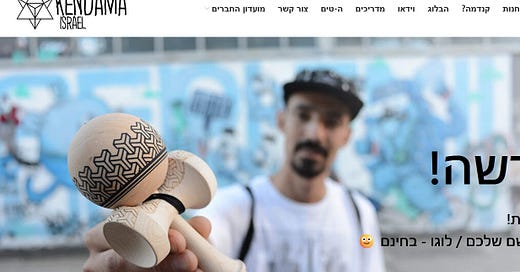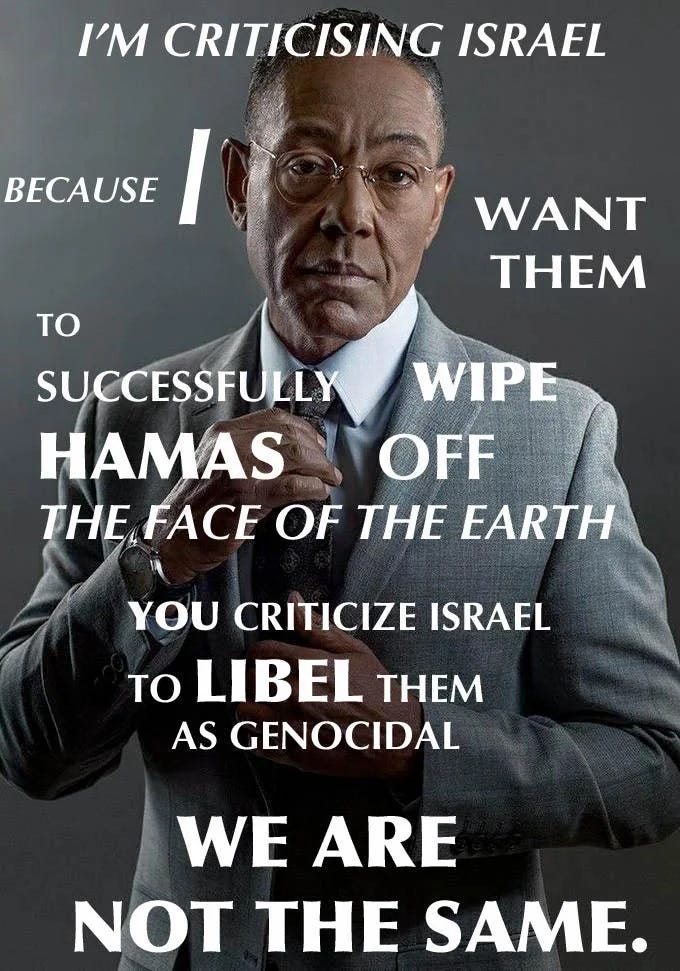Tags: Internal Content: 4 Min; Key Link: 4 Min; Videos; Jumbo Relief Area
Ramadan is over. Fears recede of riots at the Dome of the Rock. 100K-200K attended on many days.
I've spent a lot of time wondering about the economy. Three small businesses within a block of my apartment are gone (tattoo parlor, coffee stand & cafe). One has been replaced by a plant store. The Kendama store a few blocks away yet lives.


(I have followed this guy for several years. [Thanks N.Z.!] He moves every couple years to a new location. Buy a kendama, he engraves it free with a name, phrase or artwork. Today I discovered he sponsors an enthusiast gathering near the store every Friday afternoon.)
At the End of Ramadan
From the Twitter account of the Sky News network in Arabic (broadcasting from the United Arab Emirates). Jewish men and women are seen handing out dates to Muslims in the Old City of Jerusalem before the time of breaking the Ramadan fast.
If You Read One Thing This Week About the war or Gaza
Want to see Gaza and the war through the eyes of Palestinians who fled from Gaza to Egypt? In recent weeks, Haaretz journalist Shlomi Eldar visited Cairo to meet some of the tens of thousands of Gazans who have fled there since October. The piece is 4-5 minutes to read, fascinating and full of interviews.. (PDF here.)
Raf footnote: Early in the above article, Mr. Eldar cites high prices in Gaza for staples like sugar. Raf believes that Mr. Eldar was in Cairo in February/March. All available information indicates that food tonnage into Gaza dramatically increased some time in the first half of March and that while shortages certainly exist (gasoline, for example), the only current profiteering and pilfering of foodstuffs is by Hamas.
Israeli Opposition Leader Yair Lapid in Washington DC, past few days
“We came here today to remember that things we take for granted, should never be taken for granted. This spring sunshine above our heads should not be taken for granted. In its place could be the gloomy, threatening darkness of tunnels under the ground.
The family and friends around us should not be taken for granted. We could be ripped apart from them, they could disappear from our lives, not knowing their fate for months on end.
The fact that we are healthy should not be taken for granted. We could be injured, with broken bones that no one treats, with bleeding cuts that no one bandages, without medication, without treatment, slowly, painfully, fading away.
Our self-respect should not be taken for granted. We could be in a place where we are beaten, raped, where at any given moment we can be humiliated and tortured, and no one will come to help us.
The food we eat should not be taken for granted. It could be replaced by constant hunger. By half a pitta a day. We could be with a 10-month-old baby who no one feeds, looking at him helplessly until he dies.
The security we feel could be replaced by fear.
Not normal fear. Fear as a way of life. Constant fear. Fear for days and weeks and months until the soul is crushed and fear is all that is left.
We came here today to say that there are truth and lies in this world. There is justice and injustice. There is right and wrong. The hostages in Gaza are not occupiers, they are victims. They are not oppressors they are victims. They are just innocent victims.
They are victims of terror and hate. And they are the victims of all those who remain silent. All those who tell us there are two sides to the story. No, there are not. There are no two sides to the story. Because this is not a story. These are real people. This is Romi aged 23. This is Alex aged 76, the son of Holocaust survivors. This is Kfir, who was nine months old when he was kidnapped, and is a year and three months old now.
We are here because they are real people, and their suffering is real. And they need to come home.
Each one of us is responsible for their fate. No one has the right to forget. No one has the right to pretend this is normal and life goes on. It doesn't. Every person, every leader, every government, needs to be part of the effort to bring them home. We won't let the world forget. We will not rest until they come back home. That is the most important thing.
That is the only thing that should be taken for granted.”
Opposition Leader Yair Lapid at yesterday’s demonstration to #BringThemHomeNow in Washington, DC 🎗️
German Rap: Antilopen Gang - Oktober in Europa
Lyric Extract:
In September, I played piano in front of the Red Flora
Seven thousand Antifacists act like a community
Tears flow during the song 'My father is missing'
And a month later, everyone was strangely quiet
(they say) "It's complicated, you just have to see both sides"
When terrorists rape women in piles of corpses
David stars are sprayed on the front doors
Is this the so-called criticism of Israel?
Civilians in Gaza are shields for Hamas
[Civilians are] Shields for the descendants of those who gassed Jews [Hamas]
Shields for those who otherwise always act brave
(those who post) "Blah blah blah, never again blah blah" on Instagram
Berkeley closer to Tehran than to San Fran' (I mean to the mullahs and not the students)
I wanted to go to the Antifa demo against anti-Semitism
But there was none in Berlin, goodnight
October in Europe.
Social Media Bits
If the only civilian deaths you care about are in Gaza...
... then maybe you have a problem…
Note: Leaving the Gaza fatality count aside, there are ranges to some of the figures above. For example, fatality estimates for the Iraq war range from a quarter million to over a million. (An elective war without a casus belli. Where is the outrage over that? Oh never mind….)
Relief Area
Alef
Bet
Gimmel
Dalet: Am Israel High
Israel
Jamaica
United States
Chile
Canada
Hey
Vav: Eretz Nehederet
(Raf finds this one best if you’ve read the “read one thing” above by Shlomi Eldar in Haaretz.) 3 Min, Hebrew w/English Subs
At a dinner table last night, the forty-something host sitting next to me just returned from reserve duty in Gaza. He is a Lieutenant Colonel. A few weeks ago he was shot through the upper arm. Shot on Friday, in the hospital for a day, at home for a day. Monday: Back on the battlefield. He showed us the scars where the bullet entered and exited. One on each side of his arm. This is an educated man, fully Western in his values. To illustrate what such officers experience, here is a detailed write up by the son of some acquaintances of mine. E. is a reservist in a combat unit:
One of my soldiers is a paramedic. He’s been in every major conflict since the Second Lebanon War and is getting close to the age where he’s no longer required to perform combat duties. He decides to take a GoPro with him for posterity. He sends me a video of our last round in the Gaza Strip. Hardcore urban warfare, close quarters, claustrophobic almost. We’re tasked with destroying a building that has a strategic overwatch on our positions. Hamas terrorists use the roofs of civilian houses to observe troop movements and shoot ordinance at tanks or snipe soldiers that stray out of cover. This particular building has a direct line of sight and is threatening our defensive posture. We plan the mission with the brigade commander and prepare our equipment. Civilians have been told to evacuate months ago and only combatants are supposed to be in the area according to intelligence reports. We navigate to our determined jump off point. On the way I see a dead body behind cover, a military aged male, probably in his late 30s. Somewhat of a red flag. All the other non-combatants that we’ve seen up until now have been with their families. It’s extremely difficult to tell who is who; there have been numerous accounts of Hamas operatives walking around in civilian clothing without insignia but carrying grenades in their pockets or picking up weapons they’ve hidden and engaging IDF positions. When they’re eventually killed, they appear to be “civilian casualties”. It probably constitutes a war crime, not that it changes anything. … We reach our jump off point and start suppressive fire on the target buildings. Given the proximity to our position we need to be careful of ricochets so we aim mostly at upper floors. Urban warfare protocols suggest that where there are no indications of non-combatants, houses should be cleared with a grenade to minimize risk to the attacking force and to neutralize threats early. We’re not expecting any resistance anyway; the entire building looks like Swiss cheese from 50 calibre shells. We’re stacking up on the wall before we breach and clear the house. The guys on point take a split second decision to clear the ground floor with small arms fire. Even at the rear of the stack, I can hear shouting. An order comes over the radio to bring the translator. I take my squad behind cover. We’re exposed on three sides in the street and I’ve heard of Hamas using psychological operations, essentially deception techniques, where civilians are sent to surrender as a cover for a counter attack or to drag attacking forces into premeditated traps. Each person is searched for weapons or explosive ordinance. Turns out an entire family was in the bottom floor of the house. Two military aged males, two females and two children in wheelchairs. We put the children back into their wheelchairs and take them outside. The video shows the paramedic and me sorting out the wheelchair and preparing them to go through the humanitarian corridor. The kid is clearly intellectually impaired, balding, possibly malnourished, incontinent, and seems to have a central line used to inject medication. I place her feet on the foot rests so her legs won’t drag on the floor. It seems like she has clonus which makes her leg shake when it’s in flexion. I need to readjust the angle so they’ll stay on the chair. Both children are eventually covered and sent to an aid camp south of our position. My paramedic is really disturbed by what he’s seen and how such a brutal regime could abandon those they’re supposed to care for. “Fuck Hamas” he says. The video cuts out.
Our translator later tells us that the mother asked for help with the central line and for more medication for her child. We don’t carry oncology drugs and even if we did, giving her a bolus of anything through an infected line would most likely have put her into septic shock and killed her. I’m not trying to make a political statement by any means or suggest that the situation was a simple dichotomy of wrong vs right. Non-combatants were told many times to leave and were given more than enough reasonable opportunities to exit an active combat zone. It’s also not easy to judge a parent who thinks they’re acting in the best interest of their family, unsure if they’ll even make the corridor with severely disabled children. We acted in accordance with rules of engagement and the Geneva convention.
It’s easy to judge situations out of their context and from the comfort of safety. It’s easy to throw around accusations of war crimes when there’s time to go over the details in black and white; but that’s not war. War is grey. War is turbid and complicated. We almost accidentally killed a family.
Folks like this are at the dinner table. Not every night (for me). But regularly. Or the guy at the next table in the cafe, with an M16 on his knees, off duty for a couple days.
The U.S. was on combat footing in Iraq and Afghanistan for several years (arguably through today). During those many years, I might have had two meals with soldiers who had been there. Maybe. A close friend’s brother was in combat, I believe. But my circles are far from the American military. In Israel, a small place with mandatory service, every family is a military family. Every family has a member who has been injured, physically or psychically, by combat.
A guy at the table, who I believe aged out of his combat status, told what his wife did when he was in Lebanon during the second Lebanon war (2006). She took the kids to the Beach for an afternoon and left a note on the apartment door: “Dear Casualty Notification Officers: I’m at Gordon Beach. Find me there.”
Life has surreal aspects. Armies and wars surface them most profoundly.
Stay well,
Raf
(Thank you A.K., N.Z.)








